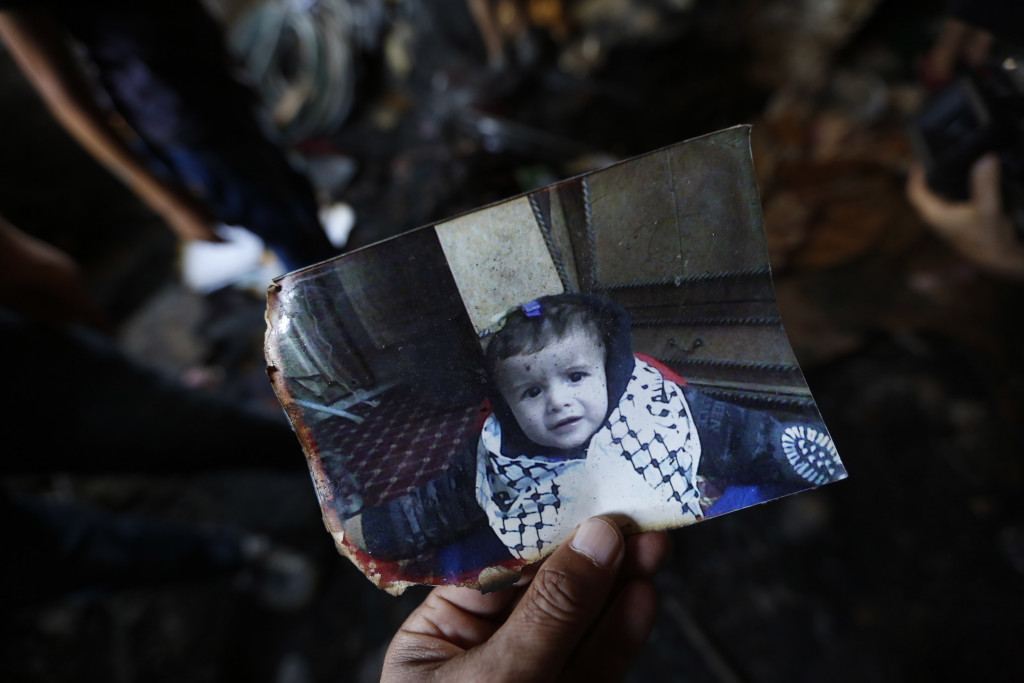by A.J. Caro*
“Did you hear the news?” asked my driver and teacher Mohammed, as we were leaving Ben Gurion Airport after my arrival Friday afternoon. “No,” I said, “have been flying for the last 10 hours.”
Mohammed, in his usual calm, matter-of-fact way, described how a family of four—mother, father, and two toddlers—was burned alive while sleeping in the village of Douma, outside the northern West Bank city of Nablus. The 18-month-old toddler, Ali Dawabsha, was burned to death. The other three remained in critical condition with third-degree burns until the father, Sa’ad Dawabsha, perished on August 8. As the Israeli newspaper Haaretz reported:
According to witnesses, at roughly 4 A.M. Friday morning, two masked men arrived at two homes in the village of Douma, not far from the settlement of Migdalim. They sprayed painted graffiti reading “revenge” and “long live the Messiah” in Hebrew, breaking the windows of the homes and throwing two firebombs inside…. One of the two homes was empty at the time, but there was a family in the second: 18-month-old Ali Saad Daobasa, his father Sa’ad, mother Reham, and 4-year-old Ahmed…. According to eyewitnesses, the father was able to rescue his wife and 4-year-old son, but could not locate the baby, Ali, in the darkness.
“Can you imagine?” Mohammed continued. “Can you imagine?” I could not and still cannot; nor will I ever be able to do so.
The two terrorists suspected of breaking the windows and throwing the firebombs were seen fleeing to a nearby Jewish settlement, Ma’aleh Ephraim. Later on the same day during protests at the Atara checkpoint on the northern side of the West Bank capital city Ramallah, the Israel Defense Forces (IDF) shot Laith Al Khaldi, a 17-year-old Birzeit University student and resident of the Jelazone refugee camp. The student died after two operations failed to save him.
The killing of Palestinian people, including by burning, is old news. Just over a year ago, Mohammed Abu Khdeir, another 17-year-old, was kidnapped and burned alive in Jerusalem. B’tselem reports that, “since August 2012, Israeli civilians set fire to nine Palestinian homes in the West Bank. Additionally, a Molotov cocktail was thrown at a Palestinian taxi, severely burning the family on board. No one was charged in any of these cases. Between September 29, 2000, and 2014, 9,319 Palestinian have been killed, compared to 1,198 Israelis, as illustrated in the table below:
BREAKDOWN OF DEATHS |
||
| Israelis | Palestinians | |
| Children Killed (more on the impact on children) |
129 | 1,523 |
| Civilians Killed | 731 | 3,535–4,226 |
| People killed in the course of a targeted killing | 1 | 408 or more |
| People who were the object of a targeted killing | 1 | 238 |
| People killed on own land | 596 (53.8%) | 6,756 (98.9%) |
| People killed on others’ land | 508 (46.2%) | 73 (1.1%) |
Sources: If Americans Knew, B’Tselem, Remember These Children.
Despite the disproportionate number of Palestinians deaths, it is they who are prevented from moving and they who are corralled like cattle in the West Bank and Gaza. If they do not have the correct papers, their families are legally separated from one another—East Jerusalemites from West Bankers, West Bankers from Gazans, and those in Jordan from those in Palestine. That is the ongoing reality of Palestinian people but, on special days, like the day of the burning of the Dawabsha family, they get special treatment: “Following the attacks, fear of rioting and disorder at the Temple Mount in Jerusalem prompted restrictions on Muslim worshippers, with only those over 50 being permitted to enter the compound.”
Who should be afraid of whom?
On the way to my destination, Mohammed and I tried to comprehend the horror and grief of the Dawabsha family. We asked how a people who had experienced the extinction of six million of their own could perpetuate similar kinds of terror, hatred, and violence.
As I drifted a bit from exhaustion after the nightlong flight, my mind wandered to the Charleston, South Carolina church killings and the burning of churches thereafter, and to all the recent victims of state violence. Just connecting the dots.
Toward the end of the ride, Mohammed asked whether I knew the word insaan. It means “to be human,” he said. If you are insaan, you only want the best for other human beings regardless of the terrible experiences you have felt in your life. That spirit permeated the lesson I learned from Mohammed on July 31, 2015.
We hope that both father and son can now rest in peace, if such is possible after burning to death in hellfire on earth. A week after the deadly arson, Israeli authorities from Shin Bet and the Israeli police arrested nine people as part of a crackdown on suspected Jewish terrorists, among them the grandson of slain extremist Rabbi Meir Kahane. Several of those arrested are being held in administrative detention, that is, imprisonment without trial, but to many who understand the situation on the ground and know the history, these arrests are a “false show of firm action” intended to diffuse public outrage and criticism.
• • •
* A.J. Caro is a longtime activist in the peace and justice movement who frequently visits Palestine and Israel and other militarized areas of the world to understand the nature and impacts of armed conflicts.
A.J. Caro, “Did You Hear the News? Palestinian Lives Don’t Matter Either.” Social Justice blog, 8/12/2015. © Social Justice 2015.


